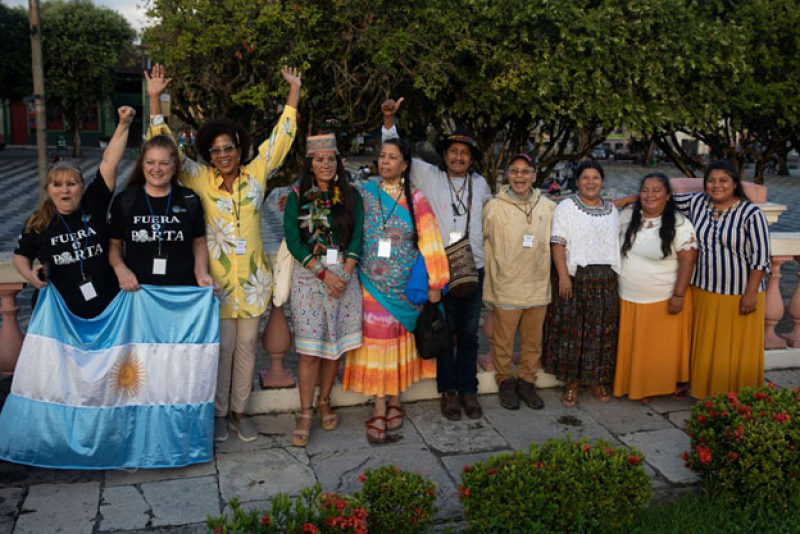- Israel Strikes Tehran with US Support Amid Nuclear Tensions |
- India Sees 9% Drop in Foreign Tourists as Bangladesh Visits Plunge |
- Dhaka Urges Restraint in Pakistan-Afghan War |
- Guterres Urges Action on Safe Migration Pact |
- OpenAI Raises $110B in Amazon-Led Funding |
Landmark Ruling Shields Environmental Defenders’ Rights

The Inter-American Court of Human Rights has issued one of the most progressive climate justice decisions of our time. Its historic Advisory Opinion on the climate emergency and human rights, released on July 3, 2025, was unequivocal: States have legal obligations under international human rights law to reduce, prevent, and address climate damage — including holding major polluters accountable.
Moreover, the ruling reaffirmed States’ duty to protect environmental defenders — individuals, communities, and organisations working courageously to safeguard human rights, territories, and the environment — whose efforts are vital in confronting the climate crisis.
This opinion is part of a growing series of climate-related rulings by international courts. It followed the landmark April 21, 2024, ruling by the International Tribunal for the Law of the Sea and preceded the July 23, 2025, decision by the International Court of Justice.
Together, these three rulings add powerful momentum to the global pursuit of climate justice and accountability, anchoring climate action in binding law and providing a roadmap for courts, advocates, and policymakers worldwide.
The Inter-American opinion process was launched two years ago, following a request by Chile and Colombia, and sparked significant interest from the international community, States, Indigenous and Afro-descendant peoples, civil society groups, environmental defenders, and grassroots organisations.
The consultative process became the most participatory in the Court’s history, with 613 actors submitting 263 briefs and 185 delegations participating in three public hearings held in locations including the Caribbean and the Brazilian Amazon.
In its groundbreaking opinion, the Court declared that we are facing a climate emergency that profoundly impacts human rights. It urged States to take urgent, effective measures — such as regulating corporations responsible for the crisis (especially in the fossil fuel industry), safeguarding the right to a healthy climate, and recognising Nature as a subject of rights.
Notably, the Advisory Opinion highlighted the crucial role of environmental defenders in fighting climate change, promoting rights-based solutions, and holding polluters accountable. At a time when democratic institutions are increasingly under pressure globally, the Court recognised these defenders as essential partners in both climate action and the strengthening of democracy and the rule of law.
This is a watershed moment for Latin America and the Caribbean — a region that accounted for 85% of the world’s documented murders of environmental defenders in 2023. Since the Advisory Opinion applies to all Member States of the Organization of American States (OAS), over 30 countries are now bound by the Court’s declaration of States’ “special duty of protection” towards environmental defenders.
That duty includes ensuring a safe environment where defenders can operate free from stigmatization, threats, restrictions, or risk to their lives, as well as investigating, prosecuting, and remedying harm — from attacks to intimidation.
The Court’s message is unequivocal: environmental defenders are entitled to impartial, timely, and thorough justice. States must initiate investigations into crimes against them ex officio — on their own initiative, without waiting for victims to act. All attacks — from threats and defamation to harassment and violence — must be addressed with equal urgency and rigour.
Criminalisation has become the most common global tactic to silence defenders, according to Global Witness. Laws increasingly target civil society groups and activists to weaken their ability to participate in climate action. In this ruling, the Court acknowledged the use of judicial harassment, arbitrary detention, excessive sentencing, and legal misuse to suppress defenders' work.
The Court also tackled the growing use of Strategic Lawsuits Against Public Participation (SLAPP suits), urging States to repeal laws that facilitate persecution, establish procedures to dismiss baseless cases swiftly, and train law enforcement and judicial actors to prevent harassment and uphold the right to defend the environment.
As in prior rulings, the Court cited the Escazú Agreement — the first binding regional treaty in Latin America and the Caribbean promoting environmental democracy, including the rights to access information, participate in decision-making, and seek justice.
The Escazú Agreement is the only global treaty with provisions specifically protecting environmental defenders. Yet, despite the region’s high defender fatality rates, not all Latin American and Caribbean countries have ratified it. To date, it has entered into force in 18 countries.
The Court’s consistent reference to the Escazú Agreement strengthens its legal and political significance. Legally, it integrates the treaty’s protections into the Inter-American human rights framework, extending them beyond the 18 ratifying countries to all OAS members. Politically, it signals to governments that ratifying the Agreement supports international human rights commitments.
However, without meaningful implementation, these protections remain fragile. Defenders — especially women, Indigenous peoples, and trans activists — continue to face heightened and unique risks. Around the world, a strong movement is growing to protect these defenders and their rights.
With this climate opinion, the Inter-American Court of Human Rights has affirmed that States have a legal obligation to be part of that movement. The time to act is now.
— Luisa Gómez is Senior Attorney at the Center for International Environmental Law (CIEL), and Alexandra Colón-Amil is CIEL Campaign Specialist.

